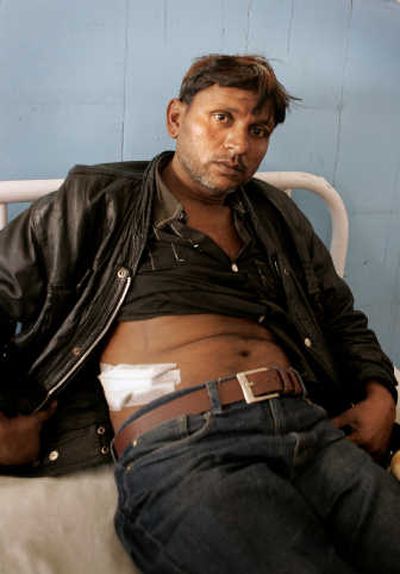Indian authorities bust kidney transplant ring

GURGAON, India – The last things Mohammed Salim remembered were the knees pinning him to the ground, the guns pointed at his head, and, finally, the injection that sent him into oblivion.
When he awoke, he was in agonizing pain, uncertain where he was or why he was wearing a hospital gown.
“We have taken your kidney,” a masked man calmly explained. “If you tell anyone, we’ll shoot you.”
Salim was one of the last victims in an organ transplant racket that police believe sold as many as 500 kidneys to clients who traveled to India from around the world over the past nine years.
Police say that when they raided the operation’s main clinic in this upscale New Delhi suburb last week, they broke up a ring spanning five Indian states and involving at least four doctors, several hospitals, two dozen nurses and paramedics and a car outfitted as a laboratory.
Subsequent raids uncovered a kidney transplant waiting list with 48 names and, in one clinic, five foreigners – three Greeks and two Americans of Indian descent – who authorities believe were waiting for transplants.
Only one doctor has been arrested so far, and police are searching for the alleged ringleader, Amit Kumar, who has several aliases and has been accused in past organ transplant schemes elsewhere in India. Authorities believe he’s fled the country.
There long have been reports of poor Indians illegally selling kidneys, but the transplant racket in Gurgaon is one of the most extensive to come to light – and the first with an element of so-called medical tourism.
The low cost of medical care in India has made it a popular destination for foreigners in need of everything from tummy tucks to heart surgery.
The Gurgaon kidney transplant racket, however, was not the type of operation the medical community wanted in the headlines. The case has shocked the country, sparking debate about medical ethics and organ transplant laws.
Some “donors” were forced onto the operating table at gunpoint, while others were tricked with promises of work, Gurgaon Police Commissioner Mohinder Lal said. There were also some who sold kidneys willingly, usually for between $1,125 and $2,250, the Hindustan Times newspaper reported. The sale of human organs is illegal in India.
Salim, 33, a laborer with five children, said he was lured from his hometown a few hours outside New Delhi by a bearded stranger offering a construction job that paid 150 rupees ($3.75) a day, as well as food and lodging. He was told the work would last three months.
“I thought I could earn money and save it for my children,” he said from a government hospital in Gurgaon.
He was first taken to a two-room house “in the jungle” outside New Delhi where two gunmen held him for six days, he said.
Then he was taken to a bungalow in Gurgaon, where armed men took a blood sample at gunpoint.
Salim said he tried to escape, but the doors were locked and within moments, the men were on top of him, sticking him with another needle while he slowly lost consciousness.
When he awoke and learned what happened, Salim thought he was soon to die – he didn’t know you could live with one kidney. He lay in a haze of pain and confusion for about a day, when the men, apparently tipped off to the coming raid, told him they had to move him.
Minutes later, police burst into the house and rescued Salim and two other men who also had their kidneys taken.